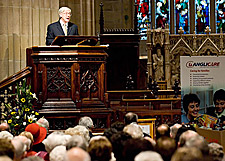Archbishop Peter Jensen says former federal Labor leader Mark Latham was right when he diagnosed the disintegration of the Australian community - and organisations like Anglicare must play a key role in keeping the cracks from spreading.
Dr Jensen addressed a service of thanksgiving yesterday at St Andrew's Cathedral to celebrate Anglicare Sydney's 150th anniversary.
 “Mr Latham is not alone in saying that something is wrong in contemporary Australia and that community is needed to put it right,” Archbishop Jensen said, referring to comments made in the recently published MP’s diaries.
“Mr Latham is not alone in saying that something is wrong in contemporary Australia and that community is needed to put it right,” Archbishop Jensen said, referring to comments made in the recently published MP’s diaries.
“Without a doubt there is an increasing sense that money is a false god and that our wealth has failed us,” he told the cathedral audience.
“In particular we have put completely unfair stress on the family unit. In our selfishness, we have taken choices that do not support and maintain family life. Lack of community is the inevitable, sad and miserable consequence.
Dr Jensen, who is Anglicare's President, says while community problems require community answers, it was vital that those answers have a spiritual and moral dimension.
“Much of what Mr Latham rightly hungers for can never come to pass without a revival of spiritual values which will motivate men and women to shake themselves free from consumerism and to devote themselves to others,” he says.
“Through Anglicare and its workers, Christians can exercise community; speaking up for the stranger; counsel the needy; welcome the lonely; connect people to one another and strengthen relationships; draw near to the sick and to those in prison.”
“Our work is, and must always be, a spiritual work " it is motivated by the gospel of Jesus Christ, it is shaped by the gospel of Jesus Christ, it understands the real needs of the community through the wisdom of the gospel of Jesus Christ; ultimately it adorns the gospel of Jesus Christ.”
The service included reflection and thanksgiving for the charity's history of serving the needy and prayers for its long-term future growth.
Stepping up involvement with local churches
Anglicare CEO Peter Kell says more and more Sydney Anglicans are getting involved in practical outreach to the needy in their suburbs and the organisation is stepping up contact with churches to help them do this.
"There is a growing reawakening in the Diocese of the feeling that we are "light on the hill' and the "salt of the earth' [of parishes showing] practical love to their communities," Mr Kell told Sydneyanglicans.net.
Mr Kell says Anglicare is increasingly being approached by parishes to discuss how that outreach can be done more effectively.
He says the organisation wants to help and encourage local churches to "do their own thing'.
"We want to initiate a dialogue with parishes to establish their interest in what we can best do together," he says.
Anglicare has recently undergone a major restructure, resulting in the appointment of a number of key senior staff.
They include a new Director of Community Care, a Director of Residential Aged Care and a Director of Strategic Support.
Anglicare's Council is looking closely at the organisation's theological basis, vision and culture in the light of the Diocesan Mission and is developing a strategic plan for the next three years.
Many parishes already have a long history of serving the poor through Anglicare by regular donations, particularly on Trinity and Advent Sundays as well as the popular winter and Christmas food and toy appeals.
Local churches at Bondi, Surry Hills, Rooty Hill, Nowra and Cabramatta help Anglicare to run programs out of buildings on church property.
A recent example was a successful partnership at Cabramatta Anglican Church, which resulted in Anglicare constructing its regional centre on the church's property, which now doubles as the parish's church building.
New projects on the horizon
Peter Kell says alongside parish partnerships, three other key areas of the organisation that will be expanded over the next five to ten years include welfare services, in particular disability support, along with residential aged care and social advocacy.
He said of particular concern to the charity in the future is the provision of mental health services and the related emergency relief program.
"For a lot of our clients, the basic problem is a mental illness," he says.
"Traditionally our strongest areas have been in children and families and emergency relief " [and this] we will continue, as a number of organisations are pulling out of emergency relief."
Established in 1856 as the Church Society under Bishop Frederick Barker, the Society's aim included the support of clergy, missionaries to the Indigenous population, the endowment of churches, the building of churches and rectories and the circulation of Bibles, the Book of Common Prayer and other "religious and useful publications'.
Today Anglicare reaches 400,000 people a year through programs including Chesalon nursing homes, counselling, migrant services and chaplains in hospitals and prisons.
Photos courtesy Robert Edwards






















